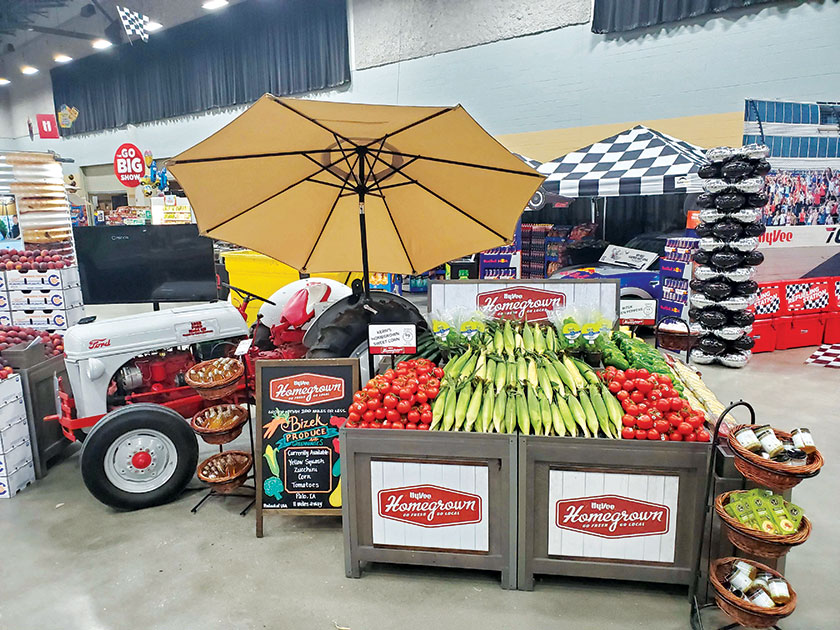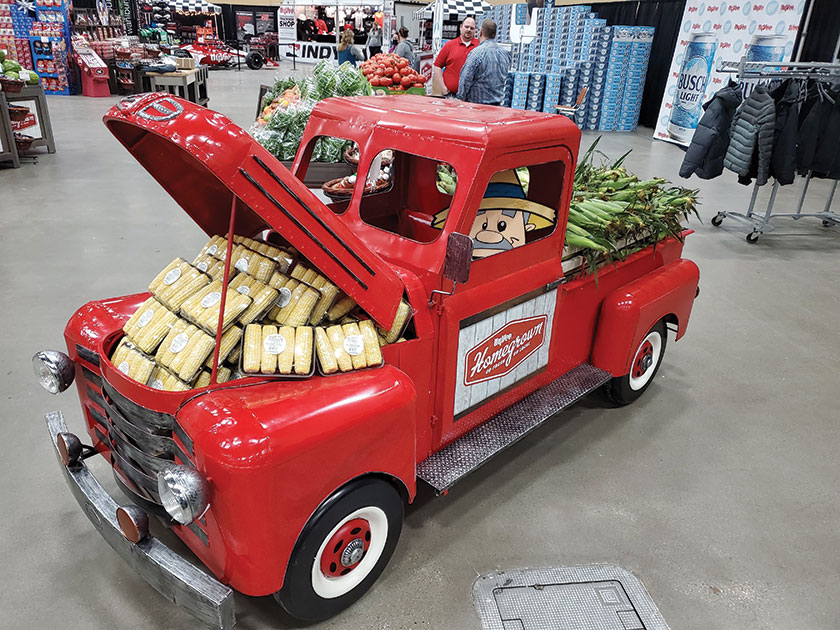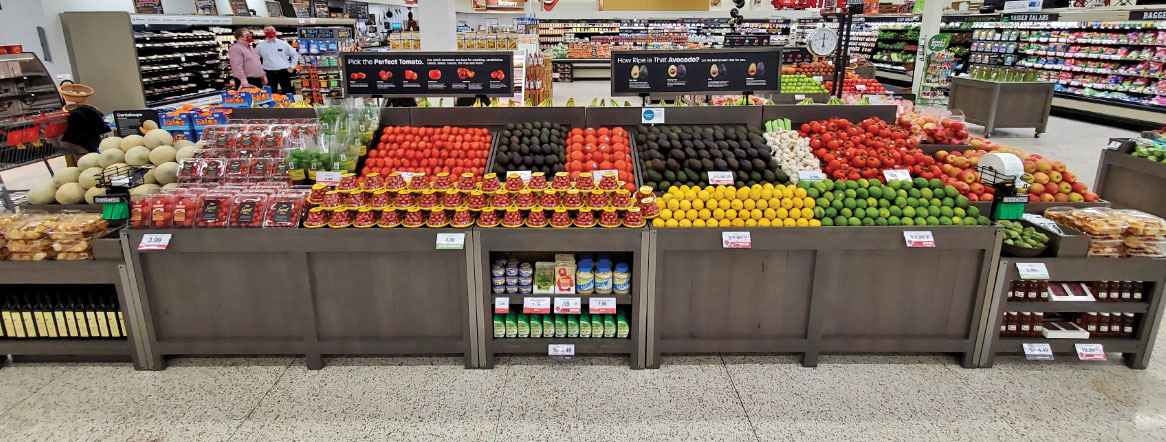Produce is star performer at Hy-Vee

If retail is theater, produce takes center stage at West Des Moines, Iowa-based Hy-Vee. The 285-store supermarket chain operates food and drug stores in a variety of formats in Iowa, Illinois, Kansas, Minnesota, Missouri, Nebraska, South Dakota and Wisconsin. Hy-Vee has seen its produce department grow steadily over the past decade.
Jeff Mallory, vice president of produce at Hy-Vee, credits part of that growth to consumers increasingly shopping the perimeter of the store, more people adopting a vegetarian or vegan diet, and a greater emphasis on healthy eating in a pandemic era.
Yet, it’s Hy-Vee’s very specific combination of selection, merchandising and service that is fueling such stellar results. “While we have only a handful of people responsible for buying produce for a $12.5 billion company, combined, they have hundreds of years of service,” says Mallory. “Our two main category managers have 64 years of experience between them. Our procurement team is the best in the nation.”
Read the full Hy-Vee special edition here.
For Mallory’s team, the desire to create an unparalleled customer experience is paramount. “We care a lot about the overall experience,” says Mallory. “That includes great customer service, but it also includes a fresh, easy-to-shop, inviting atmosphere. Produce is really artwork. It’s a show. We are strategic about color breaks and eye appeal. That phrase ‘eye appeal is buy appeal’ has never been more important in the stores,” he says.

Hy-Vee’s recently launched, reimagined store format features upgrades to the produce department, including the addition of shallow, two-sided fixtures that are easier for customers to shop and easier for store staff to maintain. “We want to be efficient without interfering with our customer experience. Instead of having long runs pushed together with slanted fronts that can be hard to reach, these table fixtures can be shopped from multiple sides. Customers can stop and pick through fresh produce without feeling rushed,” says Mallory. The new fixtures are also more efficient for the store team to restock. Product can be rotated in a more timely manner, ensuring maximum freshness and integrity.
With a variety of formats that range from small footprint stores to Hy-Vee’s new 93,000-square-foot location in Grimes, Iowa, that contains over 1,500 produce items, a one-size-fits-all merchandising strategy isn’t an option. Mallory’s team fine-tunes the mix to specific markets.
As the chain moves into the Southeast as part of its expansion plan that will add new stores in Indiana, Tennessee, Alabama and Kentucky, that approach will become even more critical. “Those consumers are likely not going to be wanting the exact same things as our customers in Des Moines,” Mallory says.
The company is currently researching which fruits, vegetables and produce consumers in those particular parts of the United States will be expecting in their stores. “While it might be OK to sell frozen okra in Iowa, okra is a staple in the Southeast. We’ll be conducting focus groups and other research to make sure we are offering what people want,” says Mallory.

Selection and variety are essential
Offering the selection that customers want is a pivotal part of the chain’s winning formula. “You have to stay on-trend, and watching trends is the most important thing that we can do for our customer,” says Mallory.
Younger consumers, exposed to new flavors from a variety of sources, from TikTok to Starbucks to shaved ice at Tropical Snow stands, are sending their parents to stores on a mission for new, interesting foods. Mallory’s team is making sure Hy-Vee stores have what those consumers are seeking.
“We have to offer more choices to the consumer,” says Mallory. “Twenty years ago, kiwi was exotic. Now, any 10-year-old knows how to peal a kiwi or cut the top off and eat it with a spoon the right way. We used to carry pomegranates in December for the holidays. Now, we import pomegranates to provide longer availability for our customers. We have jackfruit in more of our stores on a regular basis than ever before and we’re now cutting and preparing it so it’s ready to eat.”
In the next few months, the chain will launch precut mango. “Mango is the No. 1-selling fruit in the world, but it’s not anywhere close to No. 1 in the United States. Part of that could be because it’s one of the hardest fruits to prepare since it has an odd-shaped pit in the center. We think precut product is going to be a huge hit for our customers,” says Mallory.
Precut product is one of the ways Hy-Vee is driving sales. Sampling and education are other key drivers. “I can bring in beautiful dragonfruit or starfruit, but customers aren’t going to pay $9 for something when they don’t know what the inside looks like or how it tastes,” he says.
In-store signage with impact

The retailer has also expanded its selection of organic produce. “Since COVID, people that were always eating organic are continuing to always eat organic. People who were part-time organic consumers are now full-time organic consumers, and the people that ate a lot of fruits and vegetables are starting to eat more organic fruits and vegetables. It’s not a fad. It’s not a trend. It’s here to stay,” says Mallory.
In-store, point-of sale customer education is a huge part of Hy-Vee’s merchandising strategy. “We have a full education sign package that our stores can order through our sign shop and refresh as needed,” says Mallory. At the apple display, customers can learn from signage which apples are best for which specific purpose.

“We have great grower partners who develop point-of-sale material for us, complete with QR codes so customers can ‘click here for five easy recipes or nutritional information,’” he said. “Technology has made it so easy to help educate our customers. On top of that, we have our employees [who] are also educated to be able to help the customer. And that helps put product in the cart.”
The chain also invests heavily in employee training. Employees have access to monthly 10-minute “Produce Bites” educational videos that provide information about specific items — from taste profiles to instructions on how to handle the product. Each video ends with a challenge to try a new product. “It’s about driving engagement. Our staffers are more than just shelf-stockers. We invest in creating a passionate, educated employee team,” says Mallory.
Hy-Vee is also taking produce cross-merchandising to the next level. “It’s more than just cheese cross-merchandised with produce, it’s specific cheeses with grapes. The customer is looking for an experience. Maybe it’s something they had at a restaurant or an event that they want to bring to life at their own home. At Hy-Vee, we’re putting that all together for them,” says Mallory.
Convenience drives purchase
With the help of its Hy-Vee Produce Commissary, which produces Hy-Vee Short Cuts — ready-to-eat, value-added products — the department outposts produce in other departments. “We’ll offer husked sweet corn that’s already cut near the wine and spirits department or by the charcoal, meat or by bakery buns. We merchandise precut pepper and onion for stir-fry near the meat department. People are starved for time, so we do more and more of that now,” he says. The team is also testing grill-ready vegetable medley mixes in a foil pan, likely in a variety of seasoning mixes.
Understanding what people want — and when they want it — is a continual process for Mallory and his team. “Communication with vendors and staying on top of trends are really important. If we know that a product is seeing rapid growth, we need to plan for ads, display planners for our stores and communicate that through the corporate office, to our supervisors and then to the stores. We have to be able to respond quickly,” he says. “Forecasting is a critical part of the business, especially during the holidays. You have to run your numbers and take great notes.”








